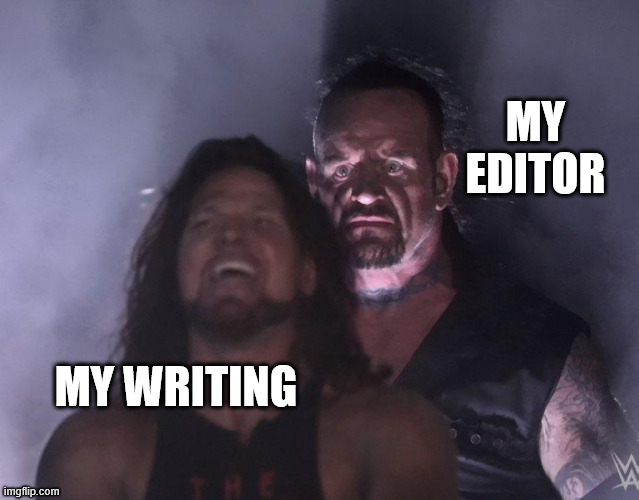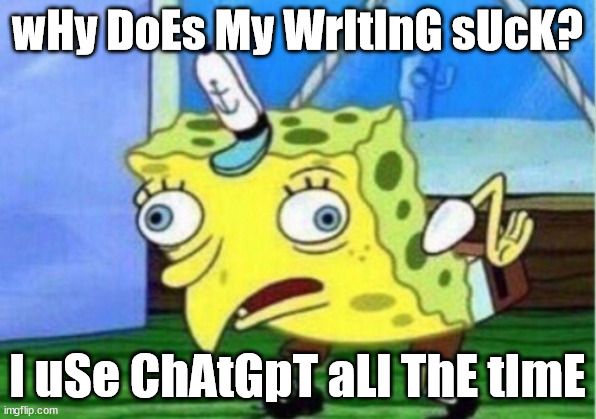Why does my writing suck? 3 common reasons
Ever wondered ‘Why does my writing suck?’ Read on to find out some common issues that both native and non-native writers encounter.
Adam Woodard
4 min read


If you’ve ever wondered ‘Why does my writing suck?’ or ‘Does my writing suck?’, then you’ve already taken the first step towards fixing the issue by anticipating your faults. It may even be the case that your writing is fine, but you still want to ensure that you’re doing the best you can. As an editor and proofreader, I’ve encountered a truly immense number of issues over 13 years or so of work - and committed one or two of them in the past. So, here’s what I’ve found.
1. You keep making assumptions
The road to bad writing is paved with assumptions. The most notable difference I’ve encountered is between native and non-native speakers of English, and what I’ve observed may surprise you. In my experience, native speakers are more likely to misuse words than non-native speakers. But non-native speakers are more likely to make grammatical mistakes.
I can only speculate about the reasons for what is, already, an anecdotal observation. It may be the case that the native speaker is more comfortable in their use of the language, giving them the confidence to be experimental with vocabulary usage. Non-natives may also be more likely to pick up a dictionary to check the meaning of a word, while a native has typically acquired their vocabulary over time, which can lead to misconceptions about proper usage.
The issue of grammar is somewhat different. Being bilingual and having worked with translators, I can tell you that a lot of mistakes come from the person translating from their native language into English in their head. This leads to them applying certain grammatical rules from their language into English.
For example, in English there’s always an article when specifying a noun. It would be incorrect to write:
‘There is always article when specifying noun.’
That would be weird. But a speaker of Russian may write something more like the above if they’re doing their internal translation, as the Russian language lacks equivalents to a or the.
Similarly, in English you can’t refer to someone purely by an adjective without a noun or pronoun. For instance, it would be incorrect to write:
‘Which book do you want?’
‘The big.’
Instead, you’d write or say, ‘The big one’, adding a (pro)noun to accompany the adjective. However, a native speaker of Italian or Arabic may inadvertently make a mistake like the one above because adjectives can be used in this way.
2. You don’t revise your work
If you start writing something and then never look at it again once you’ve reached the final full stop, then this may explain why your writing needs improvement. For reasons unknown to me, even if the thoughts we intend to write down are fully coherent and correct, our hands have a strange habit of writing or typing something different. Moreover, what seemed like a good idea at the time can turn out to be less-than-ideal in hindsight.
Typos, structural issues, incomplete sentences, and many more mistakes are likely to slip through the cracks if you never revise your own work. As anyone who’s had to go through an editor knows, simply writing something is only the first part of a much longer process.
3. You don’t read
It would be pretty hard to make a tasty meal if you’d never eaten before. What would your frame of reference be? The same applies to writing and reading. If you’ve never read exceptional writing, how would you know if you’re producing it? This would be like learning an instrument without listening to music or painting without looking at your subject. Sure, it’s possible, but why make it so much more difficult for yourself?
When I’ve encountered this issue, there has at times been the assumption that fluency is sufficient to make one a competent writer. Absent any special talent, this isn’t necessarily the case. Fluency means you can (probably) produce passable writing – and if that’s good enough, why are you reading this article?
Hard work beats talent in most cases. I remember working with a non-native speaker from the Balkans whose writing would put 90% of natives to shame in terms of clarity and consistency of quality. He clearly put in the effort and his writing was a joy to edit as a result.
BONUS: You rely on AI
I choose my words carefully. Relying on AI isn’t the same as using it. AI tools like ChatGPT can be invaluable for bouncing ideas off and organising your work. But AI-written content stands out like a sore thumb and relying on it isn’t going to cut it. Even if you start with an AI-written draft and then tweak it, this isn’t going to come across like a human wrote it. That would require significant rewriting – at which point you might as well have written the article anyway. Use AI where it can improve and complement your skills, but don’t depend on it. Given a pen and paper, you should be able to produce the same quality if necessary.
Another example is software that corrects your writing and makes suggestions for improvement. These can be invaluable learning tools if used as such, but if you rely on them catching your mistakes and don’t learn anything, then you’re just treading water in terms of your writing ability.


